11 Little-Known Reasons Why We Plant Trees in the Tropics
So why do organizations that plant trees focus their efforts on the tropics? Why not plant trees here in Germany? The answer is, we would love to see reforestation on a large scale here in Germany, but…
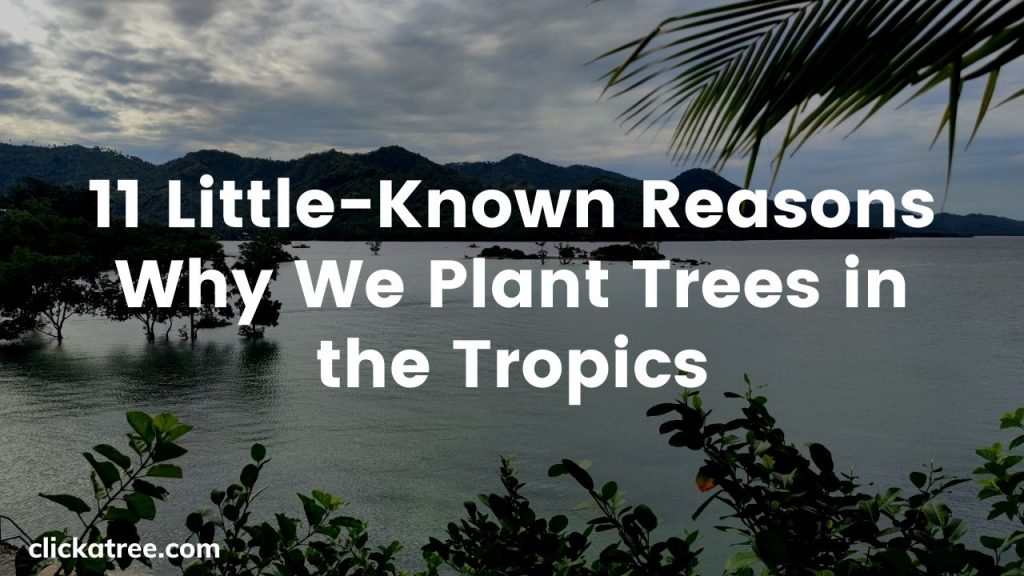
There are good reasons why we spend time and effort on reforesting the tropics. Ones that benefit us all, globally. By planting trees in the tropics we can prevent climate migration, reduce poverty and give young people a future. All that? How?
Seriously, projects that plant trees in the tropics can make a real difference in the world in ways we can barely imagine here in Germany.
In this article, we will explore 11 reasons why reforesting the tropics is important and makes sense on a global level.
1. Reforesting the Tropics Combats Climate Change Worldwide
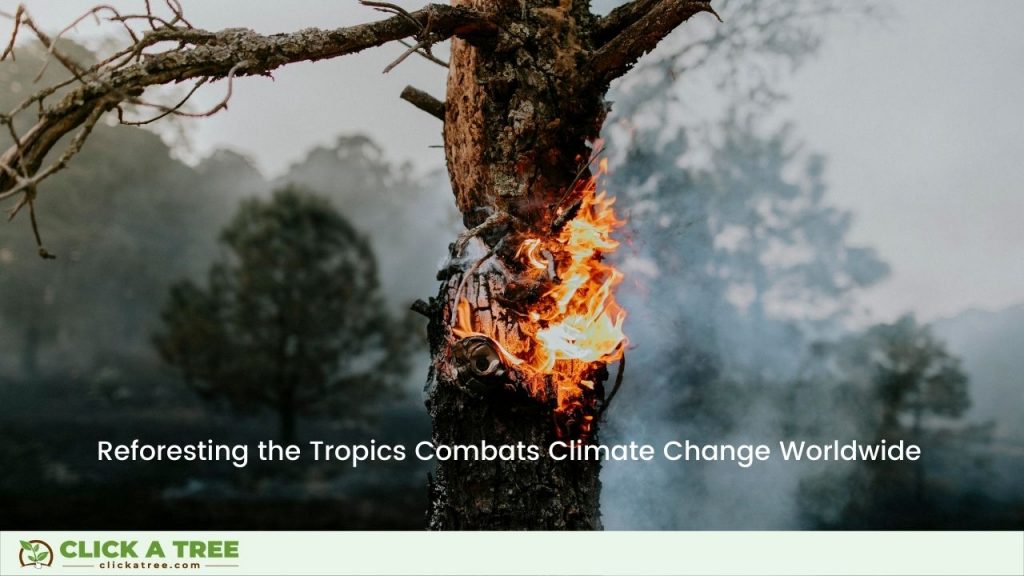
Every tree planted helps to combat climate change. NASA estimates that tropical forests absorb 1.4 billion tons of harmful CO2 each year1, which is around 2/3rds of the CO2 produced by the countries in the EU. This shows that reforesting the tropics makes an impact on a global scale.
Fact: Trees in the tropics grow very quickly as they don’t need a winter break. By providing tropical trees with the right conditions to grow into forests, we can reduce the amount of greenhouse gases in our planet’s atmosphere in our immediate future.
2. Planting Trees in the Tropics Makes A Big Difference to Local Communities
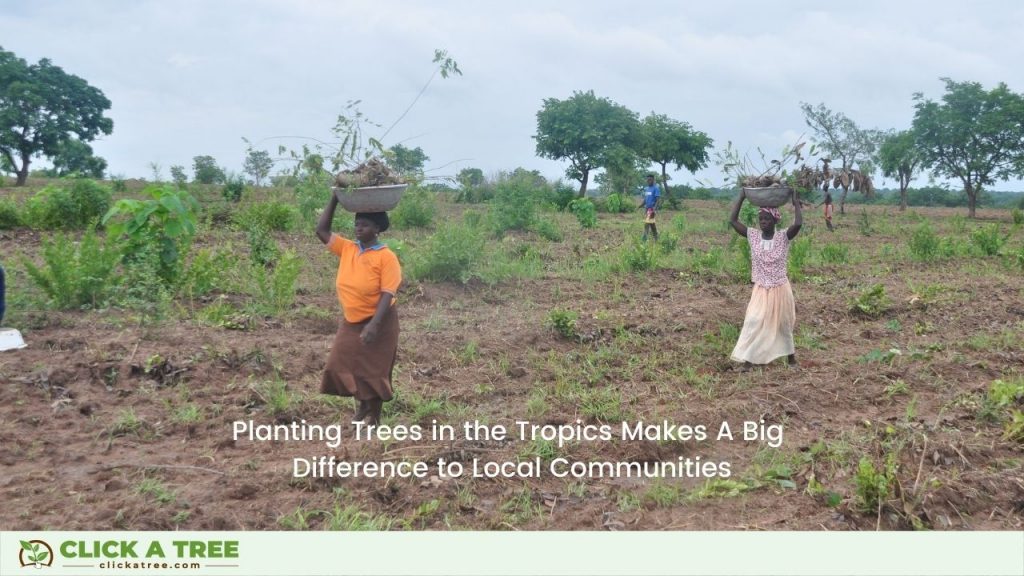
A reforestation project has to be well-planned to be successful. Trees need continued care and attention to grow and, at the same time, should provide further value to the local community to ensure continued support.
At Click A Tree we are well aware of this fact. Our project in Ghana, for example, integrates syntropic agroforestry. This means our growing forests double as a plantation that produce crops for local people to eat and sell.
This way planting organizations establish an essential income for the local community while benefiting the environment.
Your contribution makes a real difference – each tree you plant becomes part of a sustainable community project, which provides employment and opportunities for education in a country where these are rare.
3. We Can Plant More Trees in the Tropics
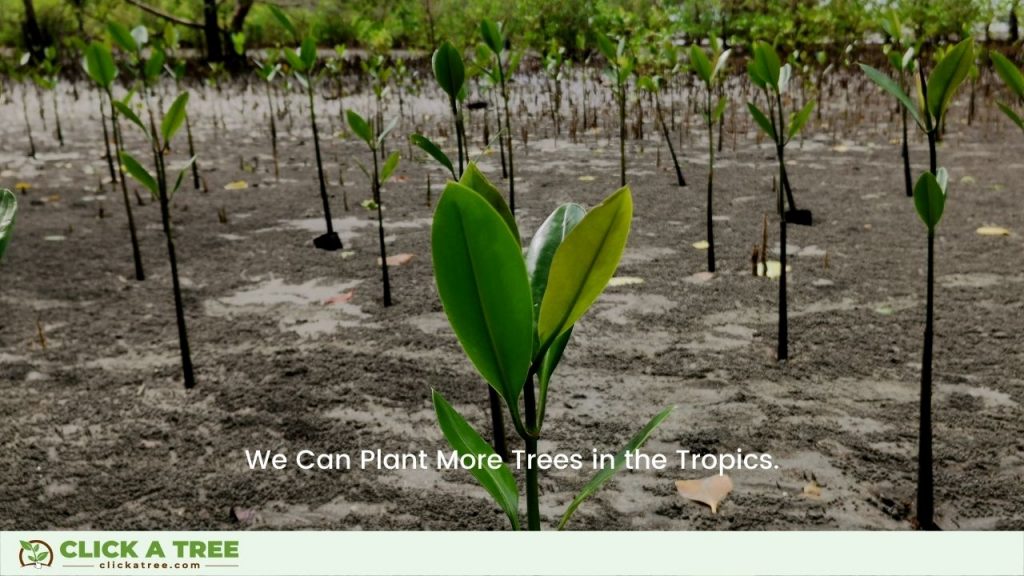
One reason we plant trees in the tropics is that it is more cost-efficient than planting them in a country like Germany. The financial planning for our projects is carried out with great care to ensure that we can plant the maximum number of trees of indigenous varieties. And that will also provide the most environmentally and economically
benefits.Fact: The planning and bureaucracy cost less in the tropics than they do in Germany. This gives us more money to pay our co-workers on site well and to plant trees that result in a greater benefit to the environment!
4. Trees Provide More Than a Livelihood – A Way of Life
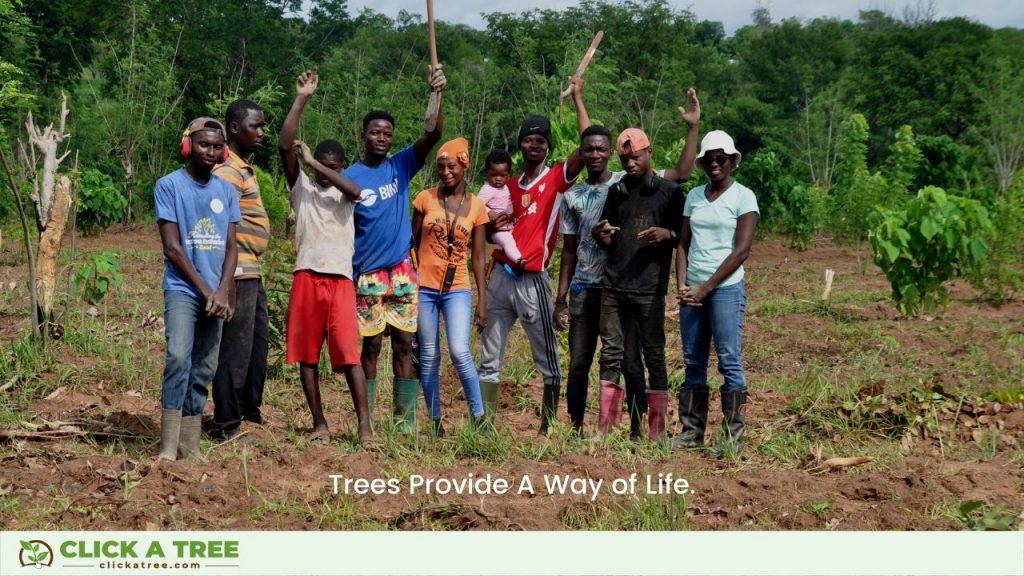
Farming and drawing subsistence from nature has been a way of life for people in countries like Ghana and the Philippines for countless generations. Economic factors, climate change and past political upset have thrown many into poverty. Planting trees with Click A Tree helps local communities to re-establish their way of life.
In Ghana, each tree planted becomes part of a plantation that supports an entire community. This means that for local people this is not just a 9-5 job – it is the basis for an entire way of life.
5. Invest in the Future – Opportunities Beyond Reforesting
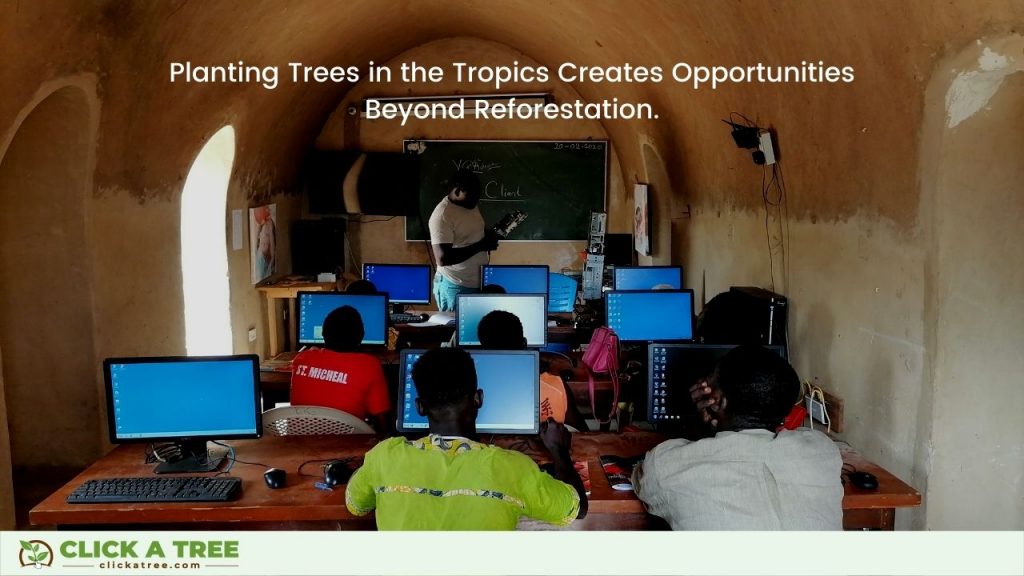
In areas where employment is scarce, the opportunity to make something of yourself is prized beyond anything. It allows local people to build a future for themselves and their families. For this reason, organizations that plant trees in the tropics do more than just grow things in the ground.
In Ghana, the trees you plant help support a local school for entrepreneurs where young Ghanaians learn how to write business plans, conduct market research and find opportunities to market their products. There is no better gift than giving someone a future!
Fact: By planting trees in the tropics you can support 16 of the UN’s Sustainable Development Goals.6. Plant Trees in the Tropics to Fight Desertification
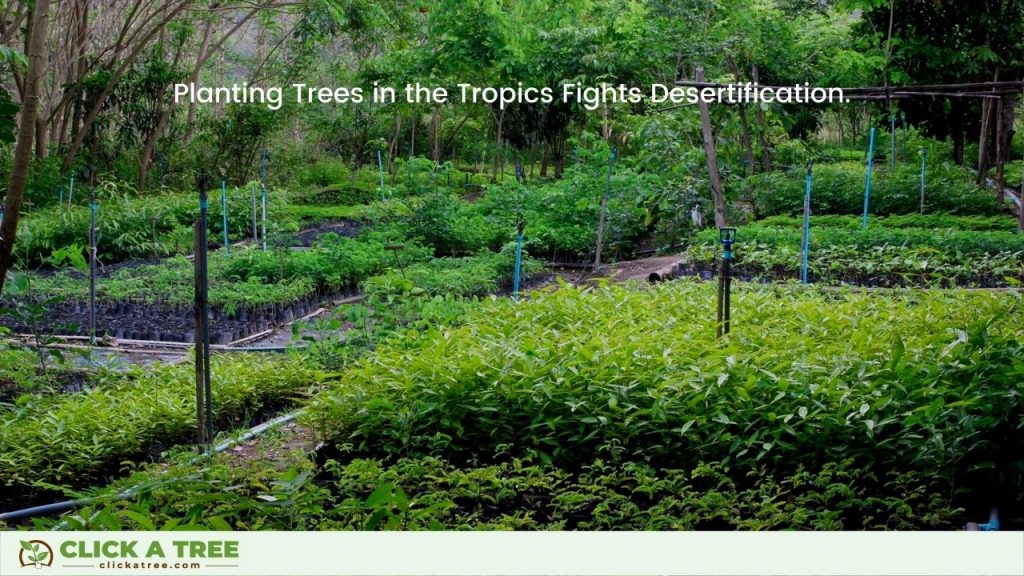
We have all seen the headlines: desertification is spreading as tropical forests are disappearing at an alarming rate, cut down to feed beef cattle or grow cash crops for export to foreign countries.
We won’t dwell on these topics in the scope of this article. The important thing is that we can do something about it!
Fact: Trees prevent soil erosion, help retain soil nutrients and restore the water cycle. Planting trees restores essential life support to regions hit hard by drought, supports sustainable ways to grow crops and actively fights desertification.
7. Trees Provide Clean Water for Communities

Trees provide an important water storage and cleaning function as they absorb rain through their leaves and then slowly release it through their roots over time. The roots stabilise the soil and provide much-needed moisture which helps grow food crops for the community.
Forests absorb heavy rains, prevent flooding and provide clean water through their roots.
8. Timely Reforestation Prevents Climate Migration
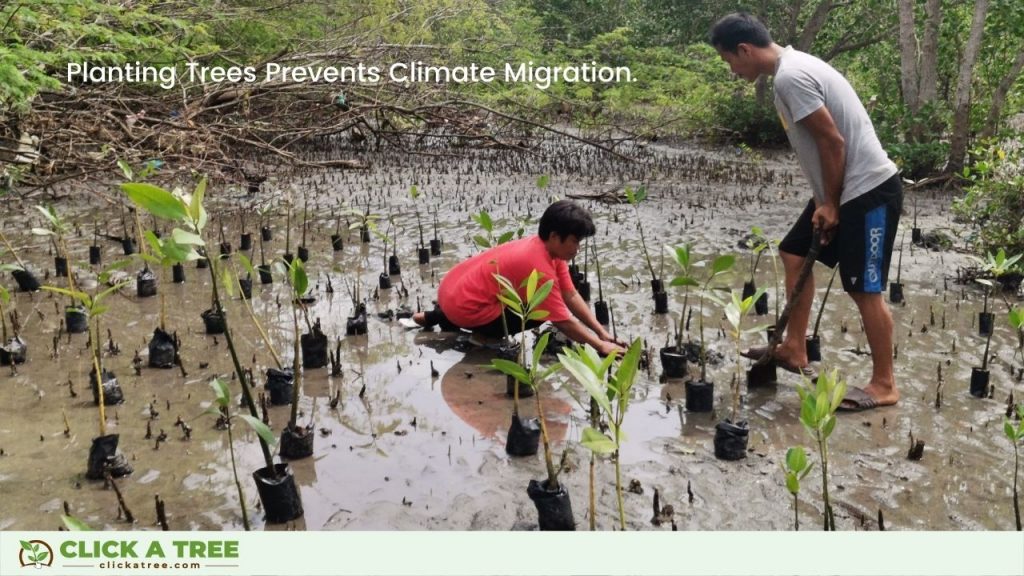
Climate migration results when the land can no longer support people due to climate change. Drought, followed by flooding has already affected many countries in the world.
Trees help prevent climate migration in two ways: locally, they stabilise the soil preventing erosion during dry periods and regulating nutrient run-off during heavy rains. Combine this with their ability to absorb harmful CO2 to combat climate change!
Fact: With every contribution that allows us to plant trees in the tropics, we can help prevent climate migration.
9. Plant trees in the tropics to save wildlife
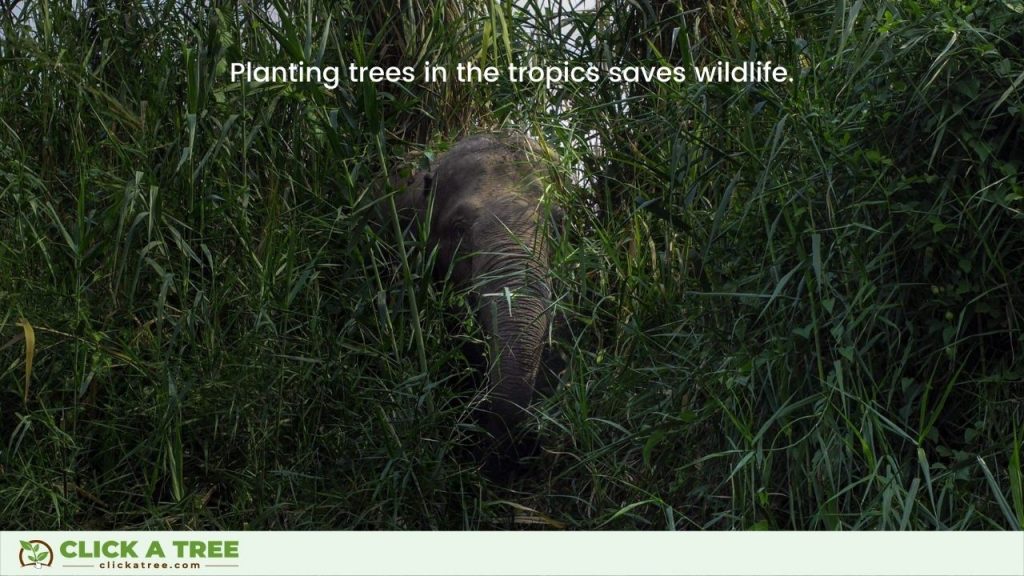
The tropics are home to 78% of all the world’s animal and plant species. Several are endangered and most can be found in and around forests, where they find shelter, water, food and places to raise their young. Even just a single wonderful tree such as the baobab can make a huge difference in the right place!
A single baobab tree provides life support for many animals, offering shelter, food and water in dry regions. With your help, we can plant more baobab trees!
10. Reforesting the Tropics Protects Coastlines
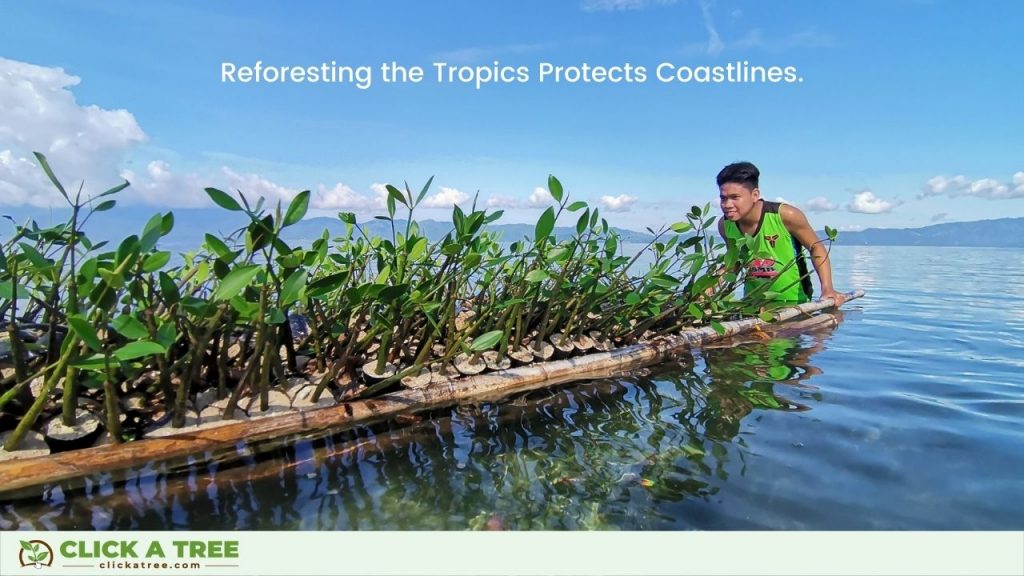
Mangrove forests form a vital barrier that protects otherwise vulnerable coastlines from tropical storms. The trees’ roots prevent coastal erosion, while the forests themselves provide essential shelter for both animals and humans.
Organizations that plant trees recognise this, and for this reason, one of Click A Tree’s projects is dedicated to replanting mangrove forests in the Philippines and Madagascar. With your contribution, we can plant trees to strengthen these beautiful islands’ protective mangroves.
11. Mangrove forests support entire communities
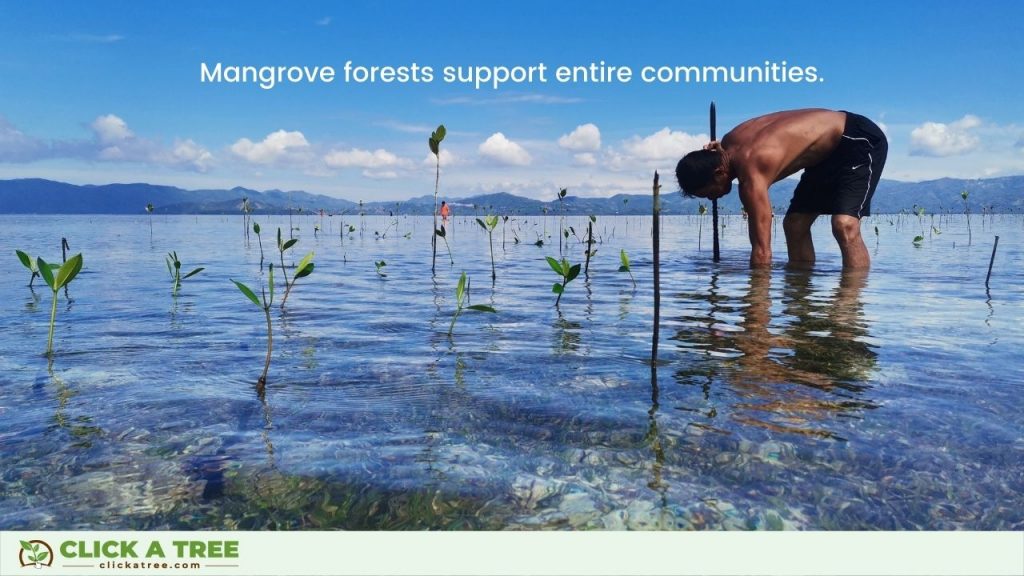
Mangrove forests also play an essential role in the economy of these islands. Not only do they protect important crop-growing regions inland, but mangroves are also a habitat for marine life which includes several commercially valuable species.
For local people such as Wilson Gastanes reforesting the mangroves has restored a way of life they thought they might lose forever.

One of the reasons we plant trees in the tropics is that they create a true difference in people’s lives! How reforesting prevents climate migration: Read Wilson Gastanes’ story.
Why we plant trees in the tropics
The reason we plant trees in the tropics is that there we have the ability to make a true difference in people’s lives and for the environment.
A project like Click A Tree’s Trees for Entrepreneurs provides a livelihood for an entire community and benefits the environment. This is a huge responsibility that involves careful planning and means making the most of the funds and resources available.
Fact: With your help, reforesting the tropics can effectively prevent climate migration, reduce harmful CO2 in the Earth’s atmosphere, provide shelter for endangered species and create a future for workers and their families.
This makes a tree a gift truly worth giving!
Sources:1 https://www.nasa.gov/jpl/nasa-finds-good-news-on-forests-and-carbon-dioxide/